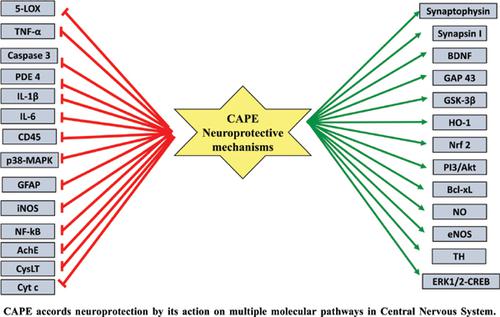Current Neuropharmacology ( IF 4.8 ) Pub Date : 2021-08-31 , DOI: 10.2174/1570159x19666210608165509 Namrata Pramod Kulkarni 1 , Bhupesh Vaidya 1 , Acharan S Narula 2 , Shyam Sunder Sharma 1

|
Neurological disorders like Alzheimer’s disease (AD), Parkinson’s disease (PD), stroke, amyotrophic lateral sclerosis (ALS), Huntington’s disease (HD), epilepsy, traumatic brain injury (TBI), depression, and anxiety are responsible for thousands of deaths worldwide every year. With the increase in life expectancy, there has been a rise in the prevalence of these disorders. Age is one of the major risk factors for these neurological disorders, and with the aged population set to rise to 1.25 billion by 2050, there is a growing concern to look for new therapeutic molecules to treat age-related diseases. Caffeic acid phenethyl ester (CAPE) is a molecule obtained from a number of botanical sources, such as the bark of conifer trees as well as propolis which is extracted from beehives. Though CAPE remains relatively unexplored in human trials, it possesses antioxidant, anti-inflammatory, antimitogenic, and anti-cancer activities, as shown by preclinical studies. Apart from this, it also exhibits tremendous potential for the treatment of neurological disorders through the modulation of multiple molecular pathways and attenuation of behavioural deficits. In the present article, we have reviewed the therapeutic potential of CAPE and its mechanisms in the treatment of neurological disorders.
中文翻译:

咖啡酸苯乙酯 (CAPE) 在中枢神经系统疾病中的神经保护潜力:机制和治疗见解
阿尔茨海默病 (AD)、帕金森病 (PD)、中风、肌萎缩侧索硬化症 (ALS)、亨廷顿病 (HD)、癫痫、创伤性脑损伤 (TBI)、抑郁症和焦虑症等神经系统疾病导致全球数千人死亡每年。随着预期寿命的延长,这些疾病的患病率有所上升。年龄是这些神经系统疾病的主要危险因素之一,随着到 2050 年老年人口将增加到 12.5 亿,人们越来越关注寻找新的治疗分子来治疗与年龄相关的疾病。咖啡酸苯乙酯 (CAPE) 是从多种植物来源获得的分子,例如针叶树的树皮以及从蜂箱中提取的蜂胶。尽管 CAPE 在人体试验中尚未得到探索,但临床前研究表明,它具有抗氧化、抗炎、抗有丝分裂和抗癌活性。除此之外,它还通过调节多种分子途径和减轻行为缺陷而展现出治疗神经系统疾病的巨大潜力。在本文中,我们回顾了 CAPE 的治疗潜力及其治疗神经系统疾病的机制。











































 京公网安备 11010802027423号
京公网安备 11010802027423号